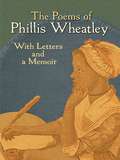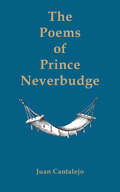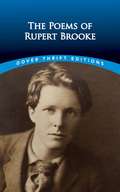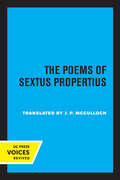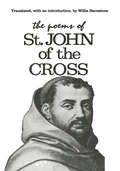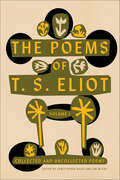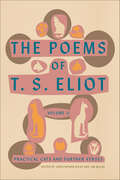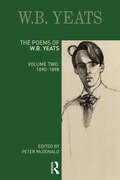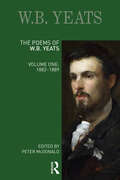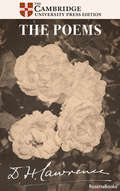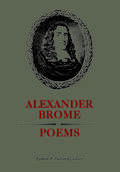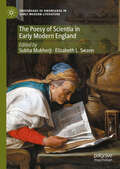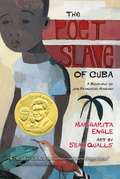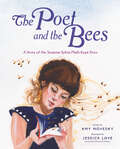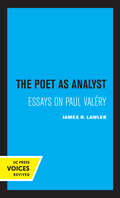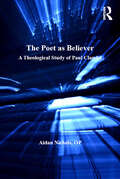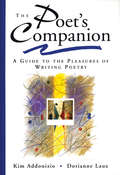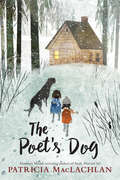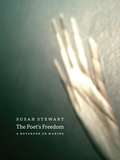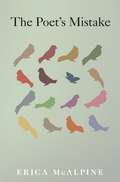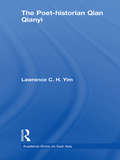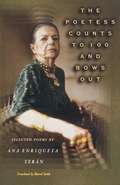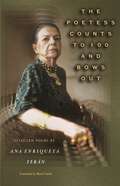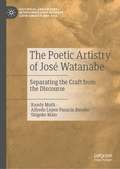- Table View
- List View
The Poems of Phillis Wheatley: With Letters and a Memoir
by Phillis WheatleyBorn in Africa in 1753, Phillis Wheatley was kidnapped at the age of seven and sold into slavery. At nineteen, she became the first black American poet to publish a book, Poems on Various Subjects: Religious and Moral, on which this volume is based. Wheatley's poetry created a sensation throughout the English-speaking world, and the young poet read her work in aristocratic drawing rooms on both sides of the Atlantic. The London Chronicle went so far as to declare her "perhaps one of the greatest instances of pure, unassisted genius that the world ever produced." Wheatley's elegies and odes offer fascinating glimpses into the origins of African-American literary traditions. Most of the poems express the effects of her religious and classical New England education, consisting of elegies for the departed and odes to Christian salvation. This edition of Wheatley's historic works includes letters and a biographical note written by one of the poet's descendants. Includes a selection from the Common Core State Standards Initiative: "On Being Brought from Africa to America."
The Poems of Prince Neverbudge
by Juan CantalejoOne summer’s day whilst holding my Grandad’s hand The Three Graces behind us Laughter and seagulls above We watched the sunset Over The River Mersey. I was four years of age and it was the day That I first heard of Prince Neverbudge! A Prince, who is believed to have sailed The Seven Seas Enlightening and entertaining all who crossed his path Those ashore and at sea He cast his spell upon them all! Many years later Whilst looking out towards The Adriatic Sea Prince Neverbudge appeared! It was the day just like today where He continues to leave me spellbound! What follows, is magic! A collection of poems sure to entertain, enlighten and keep the reader enraptured until the very last page. Poignant and moving, fresh and eclectic For any lover of poetry and adventure. Why wait? When, Prince Neverbudge awaits!
The Poems of Rupert Brooke (Dover Thrift Editions)
by Rupert BrookeThe poetry of Rupert Brooke (1887–1915) remains memorable for its charming lyrical quality and the way in which his sonnets perfectly recapture the mood of England at the start of World War I. This volume reprints his complete oeuvre, from the early lyric poems to those written shortly before his premature death: "The Old Vicarage, Grantchester," "Tiare Tahiti," "The Great Lover," "The Dead," "The Soldier," and many others. Brooke enlisted in the Royal Navy at the outbreak of the war in 1914 and entered the literary scene early the following year, when two of his sonnets ("The Dead" and "The Soldier") appeared in London's Times Literary Supplement.The 27-year-old poet died shortly afterward aboard a ship bound for Gallipoli. His 1914 and Other Poems was published immediately afterward to wide acclaim. Brooke remains among Britain's best-loved cultural figures, and his works evoke the tranquility of prewar life and the ideals of heroic self-sacrifice.
The Poems of Sextus Propertius
by Sextus Propertius"Propertius is a poet of singular boldness and originality. It is, perhaps, fitting that he have a translator to match. . .. The results justify his approach. McCulloch has remained faithful to the essential content, development, and tone of his originals. At the same time, by refusing rigid adherence tot he syntax and vocabulary of each poem, he has allowed himself the freedom to endow his versions with all the force and expressiveness that he has at his command. These are considerable, for he is a gifted poet. His versions possess a rapidity and piquancy unusual in translations. Some of his turns of phrase are quite arresting. In short, his translations are also poems in their own right." --Classical World This title is part of UC Press's Voices Revived program, which commemorates University of California Press's mission to seek out and cultivate the brightest minds and give them voice, reach, and impact. Drawing on a backlist dating to 1893, Voices Revived makes high-quality, peer-reviewed scholarship accessible once again using print-on-demand technology. This title was originally published in 1972.
The Poems of St. John of the Cross
by Willis BarnstoneSaint John's poetry of love and joy describes the soul's passage through dark night to final illumination in mystical union with Absolute Being. The allegory the poet uses is that of earthly love, and the poems are strikingly effective on the immediate level of personal experience, quite apart from their theological meanings. Many critics regard the work of Saint John of the Cross (1542-91), the 16th-century mystic, to be among the finest poetry Spain has produced. This bilingual edition, the first in modern English, was originally published in hard cover in 1968 by the Indiana University Press. Most of these poems were written during a period of nine months, in 1577-78, when Saint John (San Juan de la Cruz) was imprisoned and tortured in the dungeon of a small Carmelite monastery in Toledo, and their recurrent motifs are both metaphysical and deeply personal.
The Poems of T. S. Eliot, Volume I: Collected and Uncollected Poems (Poems of T. S. Eliot)
by T. S. EliotThe first volume of the first paperback edition of The Poems of T. S. EliotThis two-volume critical edition of T. S. Eliot’s poems establishes a new text of the Collected Poems 1909–1962, rectifying accidental omissions and errors that have crept in during the century since Eliot’s astonishing debut, “The Love Song of J. Alfred Prufrock.” In addition to the masterpieces, The Poems of T. S. Eliot contains the poems of Eliot’s youth, which were rediscovered only decades later; poems that circulated privately during his lifetime; and love poems from his final years, written for his wife, Valerie. Calling upon Eliot’s critical writings as well as his drafts, letters, and other original materials, Christopher Ricks and Jim McCue have provided a commentary that illuminates the imaginative life of each poem.This first volume respects Eliot’s decisions by opening with his Collected Poems 1909–1962 as he arranged and issued it shortly before his death. This is followed by poems uncollected but either written for or suitable for publication, and by a new reading text of the drafts of The Waste Land. The second volume opens with the two books of verse of other kinds that Eliot issued: Old Possum’s Book of Practical Cats and Anabasis, his translation of St.-John Perse’s Anabase. Each of these sections is accompanied by its own commentary. Finally, pertaining to the entire edition, there is a comprehensive textual history that contains not only variants from all known drafts and the many printings but also extended passages amounting to hundreds of lines of compelling verse.
The Poems of T. S. Eliot, Volume II: Practical Cats and Further Verses (Poems of T. S. Eliot)
by T. S. EliotThe second volume of the first paperback edition of The Poems of T. S. EliotThis two-volume critical edition of T. S. Eliot’s poems establishes a new text of the Collected Poems 1909–1962, rectifying accidental omissions and errors that have crept in during the century since Eliot’s astonishing debut, “The Love Song of J. Alfred Prufrock.” In addition to the masterpieces, The Poems of T. S. Eliot contains the poems of Eliot’s youth, which were rediscovered only decades later; poems that circulated privately during his lifetime; and love poems from his final years, written for his wife, Valerie. Calling upon Eliot’s critical writings as well as his drafts, letters, and other original materials, Christopher Ricks and Jim McCue have provided a commentary that illuminates the imaginative life of each poem.Following the collected and uncollected poems of the first volume, this second volume opens with the two books of verse of other kinds that Eliot issued: the children’s verse of Old Possum’s Book of Practical Cats, and Anabasis, his translation of St.-John Perse’s Anabase. This volume then gathers the verses that Eliot contributed to the learnedly lighthearted exchanges of Noctes Binanianæ, and others that he wrote off-the-cuff or for intimate friends. Each of these sections is accompanied by its own commentary. Finally, pertaining to the entire edition, there is a comprehensive textual history that contains not only variants from all known drafts and the many printings but also extended passages amounting to hundreds of lines of compelling verse.
The Poems of W. B. Yeats: Volume Two: 1890-1898 (Longman Annotated English Poets)
by Peter McDonaldIn this multi-volume edition, the poetry of W.B. Yeats (1865–1939) is presented in full, with newly-established texts and detailed, wide-ranging commentary. Yeats began to write verse in the nineteenth century, and over time his own arrangements of poems repeatedly revised and rearranged both texts and canon. This edition of Yeats’s poetry presents all his verse, both published and unpublished, including a generous selection of textual variants from the many manuscript and printed sources. The edition also supplies the most extensive commentary on Yeats’s poetry to date, explaining specific references, and setting poems in their contexts; it also gives an account of the vast range of both literary and historical influences at work on the verse. The poems are presented in order of composition, and major revisions or rewritings of poems result in separate inclusions (in chronological sequence) for these writings as they were subsequently reconceived by the poet. In this second volume, the poems of Yeats’s early maturity emerge in the contexts of his engagement with Irish history and myth, along with nationalist politics; his increasing involvement with ritual magic and esoteric lore; and his turbulent, often unhappy, personal life. The poems of The Countess Kathleen and Various Legends and Lyrics (1892) reveal a poet of intense narrative power and metaphorical resource, adept at transforming miscellaneous sources into haunting and original poems. A major revision of his earlier narrative, ‘The Wanderings of Oisin’, takes place in this decade when Yeats is also taken up with the composition of elaborate and uncanny symbolic lyrics, many of them resulting from his love for Maud Gonne, that are finally collected in The Wind Among the Reeds (1899). This edition makes it possible to trace in detail Yeats’s debts to folklore and magic, alongside his involved and often difficult private and public life, in poetry of exceptional complexity and power.
The Poems of W.B. Yeats: Volume One: 1882-1889 (Longman Annotated English Poets)
by Peter McDonaldIn this multi-volume edition, the poetry of W.B. Yeats (1865–1939) is presented in full, with newly-established texts and detailed, wide-ranging commentary. Yeats began to write verse in the nineteenth century, and over time his own arrangements of poems repeatedly revised and rearranged both texts and canon. This edition of Yeats’s poetry presents all his verse, both published and unpublished, including a generous selection of textual variants from the many manuscript and printed sources. The edition also supplies the most extensive commentary on Yeats’s poetry to date, explaining specific references, and setting poems in their contexts; it also gives an account of the vast range of both literary and historical influences at work on the verse. The poems are presented in order of composition, and major revisions or rewritings of poems result in separate inclusions (in chronological sequence) for these writings as they were subsequently reconceived by the poet. This first volume collects Yeats’s poetry of the 1880s, from his ambitious and extensive juvenilia (including hitherto little-noticed dramatic poems) to his earliest published pieces, leading to his first substantial book of verse. The pastoral romance of classically-inflected early work like ‘The Island of Statues’ is succeeded in these years by the Irish mythic material that finds its largest canvas in the mini-epic ‘The Wanderings of Oisin’. In Yeats’s work through the 1880s, an adolescent poet’s youthful absorption in Romantic poetry is replaced by a commitment to esoteric religious speculation and Irish political nationalism. This edition allows readers to see Yeats’s emergence as a poet step by step in compelling detail in relation to his literary influences – including, significantly, the Anglo-Irish poetry of the nineteenth century. The commentary provides an extensive view of Yeats’s developing personal, cultural, and historical worlds as the poems gain in maturity and depth. From the first attempts at verse of a teenage boy to the fully accomplished writings of an original poet standing on the verge of popular success with poems such as ‘The Lake Isle of Innisfree’, Yeats’s poetry is displayed here in unprecedented fullness and detail.
The Poems: 10 Timeless Short Stories And Poems To Read As A Family During The Advent Period (Christmas Stories Ser. #Vol. 1)
by D.H. LawrenceA collection of modern English poetry from the celebrated author of Lady Chatterly&’s Lover. This definitive collection of D. H. Lawrence&’s poems, both previously published and some not, presents here with the poems in their intended forms, reversing censorship and correcting long-missed errors for the first time. The texts are accompanied by a comprehensive study of the composition, publication and reception of Lawrence&’s most iconic poetry.
The Poems; Notes and Commentary: Vol. 1 and 2
by Alexander Brome Roman R. DubkinskiAn edited collection of poems by Alexander Brome in which Roman Dubinski has restored him to view.
The Poesy of Scientia in Early Modern England (Crossroads of Knowledge in Early Modern Literature #3)
by Subha Mukherji Elizabeth L. SwannThis book explores interconnections between the modes of knowing that we now associate with the rubrics ‘literature’ and ‘science’ at a formative point in their early development. Rather than simply tracing lines of influence, it focuses on how both literary texts and natural philosophy engage with materiality, language, affect, and form. Some essays are invested in how early modern science adopts and actively experiments with rhetorical and poetic modes and expression, while others emphasize a shared investment in natural philosophical topics—alchemy, chance, or astrology for example—that move among the period’s observational texts and its literature, highlighting the participation of literary texts in the production of experimental knowledge. Organised around the broad themes of creation and transformation, mediation and communication, and interpretation and imaginative speculation, the essays collectively probe the presumed dichotomy between science’s schematizing and taxonomic ambitions, and the fertile and volatile creative energies of literary texts.
The Poet Edgar Allan Poe: Alien Angel
by Jerome McgannJerome McGann takes his readers on a spirited tour through a wide range of Poe's verse as well as the critical and theoretical writings in which he laid out his arresting ideas about poetry and poetics. In a bold reassessment, McGann argues that Poe belongs alongside Whitman and Dickinson as a foundational American poet and cultural presence.
The Poet Slave of Cuba: A Biography of Juan Francisco Manzano
by Margarita Engle Sean QuallsA lyrical biography of a Cuban slave who escaped to become a celebrated poet. Born into the household of a wealthy slave owner in Cuba in 1797, Juan Francisco Manzano spent his early years by the side of a woman who made him call her Mama, even though he had a mama of his own. Denied an education, young Juan still showed an exceptional talent for poetry. His verses reflect the beauty of his world, but they also expose its hideous cruelty. Powerful, haunting poems and breathtaking illustrations create a portrait of a life in which even the pain of slavery could not extinguish the capacity for hope. <P><P> The Poet Slave of Cuba is the winner of the 2008 Pura Belpre Medal for Narrative and a 2007 Bank Street - Best Children's Book of the Year.
The Poet and the Bees: A Story of the Seasons Sylvia Plath Kept Bees
by Amy NoveskyA mesmerizing picture book about the iconic poet Sylvia Plath and her final writingsLove, bees don&’t live long.But honey lives forever. Words, too.Sylvia Plath is remembered for her stirring poetry and the tragic legacy her work left behind. But it is lesser known that she was a beekeeper and completed her last book of poems while tending to her bees and harvesting honey.Author and beekeeper Amy Novesky shines a new light on the life and work of Plath through the lens of her last seasons with her beloved bees—and how during their short and busy lives, they filled her with inspiration and hope—while the evocative paintings by Stonewall Book Award winner Jessica Love reveal the tenderness and wonder of one of America's most iconic poets.
The Poet as Analyst: Essays on Paul Valery
by James R. LawlerThis title is part of UC Press's Voices Revived program, which commemorates University of California Press’s mission to seek out and cultivate the brightest minds and give them voice, reach, and impact. Drawing on a backlist dating to 1893, Voices Revived makes high-quality, peer-reviewed scholarship accessible once again using print-on-demand technology. This title was originally published in 1974.
The Poet as Believer: A Theological Study of Paul Claudel (Routledge Studies in Theology, Imagination and the Arts)
by Aidan Nichols O.P.This is the first comprehensive study of the theological significance of Paul Claudel, a poet frequently cited by literary-minded theologians in Europe and theologically-minded poets (such as von Balthasar, de Lubac and Eliot). His writing combines cosmology and history, Bible and metaphysics, liturgy and the drama of human personality. His work, which continues to arouse discussion in France, was acclaimed in his lifetime as the 'summa poetica' of a new Dante. Aidan Nichols' study demonstrates how Claudel's oeuvre, which is not only poetry but theatre and prose including biblical commentaries, constitutes a rich resource for constructive doctrine, liturgical preaching, and theological reflection. As the comparable example of Geoffrey Hill, Professor of Poetry at Oxford suggests, Aidan Nichols illuminates how Claudel's synthesis of many dimensions remains an important way of practising poetry in the Christian tradition today.
The Poet's Companion: A Guide to the Pleasures of Writing Poetry
by Kim Addonizio Dorianne LauxFrom the nuts and bolts of craft to the sources of inspiration, this book is for anyone who wants to write poetry-and do it well. ?The Poet's Companion ?presents brief essays on the elements of poetry, technique, and suggested subjects for writing, each followed by distinctive writing exercises. The ups and downs of writing life--including self-doubt and writer's block--are here, along with tips about getting published and writing in the electronic age. On your own, this book can be your "teacher," while groups, in or out of the classroom, can profit from sharing weekly assignments. <P><P><i>Advisory: This book offers only partial accessibility. We have kept it in the collection because it is useful for some of our members. Benetech is actively working on projects to improve accessibility issues such as these in the future.</i>
The Poet's Dog
by Patricia MaclachlanFrom Newbery Medal winner Patricia MacLachlan comes a poignant story about two children, a poet, and a dog and how they help one another survive loss and recapture love.Teddy is a gifted dog. Raised in a cabin by a poet named Sylvan, he grew up listening to sonnets read aloud and the comforting clicking of a keyboard. Although Teddy understands words, Sylvan always told him there are only two kinds of people in the world who can hear Teddy speak: poets and children.Then one day Teddy learns that Sylvan was right. When Teddy finds Nickel and Flora trapped in a snowstorm, he tells them that he will bring them home--and they understand him. The children are afraid of the howling wind, but not of Teddy's words. They follow him to a cabin in the woods, where the dog used to live with Sylvan . . . only now his owner is gone.As they hole up in the cabin for shelter, Teddy is flooded with memories of Sylvan. What will Teddy do when his new friends go home? Can they help one another find what they have lost?
The Poet's Freedom: A Notebook on Making
by Susan StewartWhy do we need new art? How free is the artist in making? And why is the artist, and particularly the poet, a figure of freedom in Western culture? The MacArthur Award–winning poet and critic Susan Stewart ponders these questions in The Poet’s Freedom. Through a series of evocative essays, she not only argues that freedom is necessary to making and is itself something made, but also shows how artists give rules to their practices and model a self-determination that might serve in other spheres of work.Stewart traces the ideas of freedom and making through insightful readings of an array of Western philosophers and poets—Plato, Homer, Marx, Heidegger, Arendt, Dante, and Coleridge are among her key sources. She begins by considering the theme of making in the Hebrew Scriptures, examining their accountof a god who creates the world and leaves humans free to rearrange and reform the materials of nature. She goes on to follow the force of moods, sounds, rhythms, images, metrical rules, rhetorical traditions, the traps of the passions, and the nature of language in the cycle of making and remaking. Throughout the book she weaves the insight that the freedom to reverse any act of artistic making is as essential as the freedom to create. A book about the pleasures of making and thinking as means of life, The Poet’s Freedom explores and celebrates the freedom of artists who, working under finite conditions, make considered choices and shape surprising consequences. This engaging and beautifully written notebook on making will attract anyone interested in the creation of art and literature.
The Poet's Mistake
by Erica McAlpineWhat our tendency to justify the mistakes in poems reveals about our faith in poetry—and about how we readKeats mixed up Cortez and Balboa. Heaney misremembered the name of one of Wordsworth's lakes. Poetry—even by the greats—is rife with mistakes. In The Poet's Mistake, critic and poet Erica McAlpine gathers together for the first time numerous instances of these errors, from well-known historical gaffes to never-before-noticed grammatical incongruities, misspellings, and solecisms. But unlike the many critics and other readers who consider such errors felicitous or essential to the work itself, she makes a compelling case for calling a mistake a mistake, arguing that denying the possibility of error does a disservice to poets and their poems.Tracing the temptation to justify poets' errors from Aristotle through Freud, McAlpine demonstrates that the study of poetry's mistakes is also a study of critical attitudes toward mistakes, which are usually too generous—and often at the expense of the poet's intentions. Through remarkable close readings of Wordsworth, Keats, Browning, Clare, Dickinson, Crane, Bishop, Heaney, Ashbery, and others, The Poet's Mistake shows that errors are an inevitable part of poetry's making and that our responses to them reveal a great deal about our faith in poetry—and about how we read.
The Poet-historian Qian Qianyi (Academia Sinica on East Asia)
by Lawrence C.H YimThis book is the first English language study of Qian Qianyi (1582-1664) - a poet and literary critic during the Ming-Qing dynastic transition. Although Qian’s works constitute some of the greatest achievements in pre-modern Chinese lyric poetry, they have been largely understudied and are poorly understood. Qian was reputed for his own aesthetic that changed the character of late Ming and early Qing poetry. His name, however, was branded with infamy for his disloyalty to the Ming dynasty when it dissolved. Consequently, his works were censored by the Qing court and have been forgotten by most critics until recently. Lawrence C.H Yim focuses on Qian’s poetic theory and practice, providing a critical study of Qian’s theory of poetic-history (shishi) and a group of poems from the Toubi ji. He also examines the role played by history in early Qing verse, rethinking the nature of loyalism and historical memory in seventeenth-century China. Poetry of the Ming-Qing transition is distinguished by its manifest historical consciousness and the effort and give meaning to current historical events, an effort characterized by the pathos of introspection and mourning for the past..This pathos translates into what can be called a poetics of Ming loyalism, exemplified and championed by, intriguingly, the later works of Qian Qianyi himself.
The Poetess Counts To 100 And Bows Out
by Ana Enriqueta TeránAna Enriqueta Terán is arguably Venezuela's finest poet. Celebrated throughout the Spanish-speaking world, she is almost unknown among anglophones. Until now only a handful of her poems have been translated into English, giving at best a diluted impression of a uniquely intense imagination. This bilingual edition reveals the power and beauty of this poet's Spanish poems through English versions of corresponding force. It invites readers to enter Terán's world--a world at once strongly Venezuelan and universally human, imbued with great beauty, sardonic humor, pitiless compassion, lucid wisdom, and joyful affirmation. Selected from several volumes of Terán's work, these poems span half a century of composition and show an extraordinary range in both form and substance. Some are written in closed forms, some in free verse. Some are carefully evocative representations of the landscapes and cityscapes that have nourished the poet's intelligence and imagination. Others are dramatic character studies. All are infused with Terán's rare sensibility and realized through language that manages to be at once graceful, urgent, and explosive. This volume is a treasure for all lovers of poetry.
The Poetess Counts to 100 and Bows Out: Selected Poems by Ana Enriqueta Terán (The Lockert Library of Poetry in Translation #51)
by Ana Enriqueta TeránAna Enriqueta Terán is arguably Venezuela's finest poet. Celebrated throughout the Spanish-speaking world, she is almost unknown among anglophones. Until now only a handful of her poems have been translated into English, giving at best a diluted impression of a uniquely intense imagination. This bilingual edition reveals the power and beauty of this poet's Spanish poems through English versions of corresponding force. It invites readers to enter Terán's world--a world at once strongly Venezuelan and universally human, imbued with great beauty, sardonic humor, pitiless compassion, lucid wisdom, and joyful affirmation. Selected from several volumes of Terán's work, these poems span half a century of composition and show an extraordinary range in both form and substance. Some are written in closed forms, some in free verse. Some are carefully evocative representations of the landscapes and cityscapes that have nourished the poet's intelligence and imagination. Others are dramatic character studies. All are infused with Terán's rare sensibility and realized through language that manages to be at once graceful, urgent, and explosive. This volume is a treasure for all lovers of poetry. Deal Struck with Happiness ? How much sweetness to make right the night and this clutch of anemones near thin smooth consoling stones, stones havens of southern weather. Of a woman who watches Cepheids quaver among lightbursting mangroves. Of a woman who offers cats-eyes and clematis only, Islands, for the sake of setting right her deal struck with happiness.
The Poetic Artistry of José Watanabe: Separating the Craft from the Discourse (Historical and Cultural Interconnections between Latin America and Asia)
by Randy Muth Alfredo López-Pasarín Basabe Shigeko MatoConnecting multiple academic areas, this book addresses three aspects of the poetry of José Watanabe: 1) the construction of "Japaneseness" in the poetic works and public figure of the poet, 2) the skillful manipulation of literary devices characteristic of his poetry, 3) the unique sensibilities and moods of ephemerality and ineffableness prevalent in his poetic works. The trans/interdisciplinary nature of the book intends to promote a dialogue and exchange of ideas across academic fields neglected in most studies on the Peruvian poet. Written by researchers based in Japan, it offers a unique perspective of Japanese cultural phenomenon unavailable in previous studies. The goal of the book is to shed light on how Japan continues to be seen by the West through essentialist notions and stereotypical representations, as well as to highlight the fact that the literary quality of Watanabe’s poetic artistry does not reside in it being “Japanese” and can be appreciated without resorting to essentialist categorizations based on positive Japanese stereotypes.
